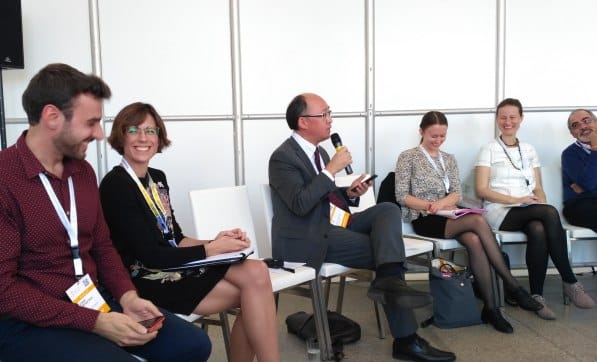Delegates from human rights communities, the arts, business, international, national and local organisations came together for the 2018 Fundamental Rights Forum in Vienna, Austria, from 25 to 27 September 2018, to share experience and discuss new perspectives on pressing human rights issues. AGE seized the momentum to further explore the drivers of ageism that act as barriers to the full and equal realisation of human rights in older age and examine how a rights-based approach can address those barriers.

In contrast with other forms of discrimination, such as racism or sexism, it (i.e. ageism) often tends to be ‘normalised’, with age stereotypes accepted and going unchallenged. It is not uncommon that age in itself is a valid justification for differential treatment, setting age limits, or excluding people from treatments or services – all undermining older people’s right “to lead a life of dignity and independence and to participate in social and cultural life”, as enshrined in Article 25 of the EU Charter of Fundamental Rights.
Building consciousness of ageism
One of the key objectives of the session was to develop awareness and understanding of ageism as a human rights violation. In fact, ageism is the most widely experienced and the most socially accepted form of discrimination, as age limits, proxies and categorisations are largely seen as useful or even necessary. Ageism involves more than discrimination; it includes how we feel, think and act towards people on the basis of their age. It is manifested at individual/interpersonal and institutional/cultural level and is often internalized and subconscious. Importantly, ageism is a driver for human rights breaches, including loss of autonomy, poverty, abuse, marginalization, adequate standard of health, etc. When it intersects with other forms of discrimination like sexism, racism or homophobia, ageism has even more negative effects for concerned individuals. Participants further agreed that ageism has important negative consequences on the health and well-being of individuals and also introduces bias in policy making.

The need to take action against ageism
The session highlighted that protection from age discrimination in international, EU and national law is insufficient and argued that legal protection must be extended, including by considering the adoption of an international legally binding instrument. In addition, EU, UN, academic and research institutions should improve research and statistics to both prevent perpetuating ageism by setting age limits in statistics and to adequately reflect the manifestations and effect of ageism across different ages, groups and settings. Moreover, media should improve their communication and avoid stereotypical images and language. Finally, the session exposed two concrete opportunities for collaboration in the field of ageism. First, the Global Campaign against ageism, led by the World Health Organisation. Second, the #AgeingEqual campaign that is launched on the 1st October by AGE Platform Europe and several other partner to mark the 70th anniversary of the Universal Declaration of Human Rights and remind that ‘Human Rights do not diminish with age’. The meeting ended with a request to the Fundamental Rights Agency to intensify their work in the area of ageism and age discrimination.
More information:
- AgeingEqual campaign: www.ageing-equal.org
- AGE position on structural ageism
- Blogpost about the session on ageism at the Fundamental Rights Forum
- FRA focus on a rights-based approach to ageing
- European Youth Forum reaction to the OHCHR report on youth and human rights
- World Health Organisation work on ageism
For more information please contact Nena Georgantzi : nena.georgantzi@age-platform.eu






